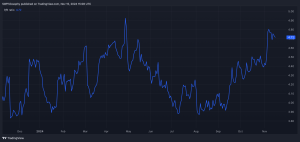Some investors are flagging up the so-called September effect, which is a theory that suggests the stock market performs the worst during this month.
Even though it’s up for debate, the FTSE 100 hasn’t had a good start to the new month. Should we get some catalysts in coming weeks that trigger a stock market crash, here’s what I’ve got on my watchlist to snap up.
Details of the September effect
A data study using monthly data from the S&P 500 from 1944 showed that there are only two months during the year that have a negative average stock market return. One’s February, with an average return of -0.01% (basically nothing). The other’s September, which has an average return of -0.51%.
Although that may spook some people, let’s consider something else. Data shows that over the past century, the S&P 500’s fallen in September 55% of the time. So really it’s basically a coin flip of being positive or negative. The difference is that when it falls, it drops more than when it rallies, hence the skew of an average loss for the month.
The bad start to this month for both the S&P 500 and the FTSE 100 comes after poor economic data from the US. The concern is that it could be heading into a recession, with sharp interest rate cuts needed quickly. Given that FTSE 100 companies are international in nature, what happens in the US also impacts the UK stocks too.
Should the US Federal Reserve meeting next week cause more worry for traders, it could trigger an even steeper market drop.
What I’d snap up
Even though the above scenario isn’t my base case, I’m prepared in case it happens. One stock I’m watching is British American Tobacco (LSE:BATS). The share price is currently at 52-week highs, up 14% over the past year.
While the half-year results showed revenue down by 8.2% versus H1 2023, there’s continued optimism around the push for a smokeless society. This grows revenue for the New Products division, housing things such as vapes. The CEO noted that during H1 “we added 1.4 million consumers to our Smokeless brands, now accounting for 17.9% of Group revenue, an increase of 1.4% versus 2023”.
I think this will enable the company to be profitable in the long term, even with traditional combustible revenue shrinking. One risk is that combustible revenue falls faster than expected. This could see profits drop and surprise investors.
Given the stock’s at a high level right now, a crash would allow me to purchase at a better price. Even if a crash is triggered by recession fears, I’m not too concerned for the firm. After all, smoking’s historically proven to be habit that people spend on even during tough times. Although the addictive nature isn’t something to be proud of, it does mean that revenue’s steady throughout the economic cycle. This should support the share price over the long run.
This post was originally published on Motley Fool







